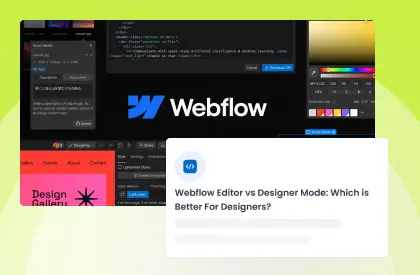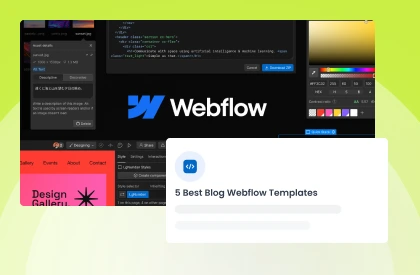Selecting the appropriate platform is essential for developing cutting-edge, high-performance websites in the dynamic field of web design. Webflow stands out in modern web design due to its diverse capabilities that address the needs of contemporary design and development.
While WordPress website builder remains popular, Webflow’s intuitive design interface, integrated tools, and streamlined approach provide significant advantages. This comparison highlights why Webflow excels in creating dynamic, visually stunning websites for today's digital landscape, and explains why Webflow is better than WordPress.
Key Takeaways
- Webflow combines design and hosting into a single platform, simplifying site management and reducing the need for third-party services.
- Webflow offers comprehensive SEO features directly within the platform, streamlining optimization without additional plugins.
- Webflow ensures fast website performance with automatic optimization, unlike WordPress needing additional plugins.
- Webflow’s integrated hosting ensures faster load times and reliable uptime.
- Webflow provides a visual design interface that allows for more precise and creative control over website layouts compared to WordPress’s theme-based approach.
100+ Top-notch Webflow Templates
Take your website design to the next level with our stunning collection of Webflow templates. making them more manageable
Brief Overview of Webflow
Webflow is a visual website-building platform that empowers users to create sophisticated websites with full control over design, content strategy, and code. Webflow is a well-known website builder with a feature-rich suite that lets users create websites with a polished appearance without knowing how to code.
As of April 11, 2024, W3Techs reports that Webflow powers 0.7% of all websites globally. Among websites that utilize content management systems, Webflow is used by 1.0%.
Its intuitive interface allows users to craft custom layouts, incorporate animations, and seamlessly integrate their websites with various tools and services. This article explores the features and tools Webflow website builder offers, showcasing its capabilities for creating cutting-edge web experiences.
Brief overview of WordPress
Due to WordPress's open-source nature as a content management system (CMS), users can create dynamic websites with ease. Because of its versatile back-end interface and abundance of components, WordPress is the most popular blogging platform on the internet.
Thanks to its versatility and user-friendly design, WordPress is an excellent option for both beginners and experienced developers. With the wide range of themes and plugins it provides, users can improve their websites' look and functionality.
According to NetCraft’s July 2024 report, there are currently 1.1 billion websites. This figure encompasses various sites, including personal blogs, corporate websites, online stores, and social networks.
Importance of choosing the right platform for web design
Selecting the right web design platform is crucial for ensuring your website meets both functional and aesthetic goals effectively.
- Impact on Creative Freedom: Selecting the right platform is crucial as it determines your creative freedom. It allows you to design websites that reflect your vision and meet your business goals.
- Influence on Efficiency: A suitable web design platform enhances efficiency by providing intuitive tools and features. This streamlines the design process, reducing the time and effort required to build and maintain websites.
- Impact on Scalability: Selecting a scalable platform guarantees that your website can develop and grow with your company. It allows for adding new features and handling higher traffic levels without sacrificing functionality.
- Function in Integration: The ideal platform should provide smooth interaction with other products and services so that you can boost the usability and functionality of your website.
- Security Considerations: To preserve confidence and adhere to industry standards, a reputable website builder must include strong security features. These features shield your website from potential attacks and guarantee the confidentiality of user data.
100+ Top-notch Webflow Templates
Take your website design to the next level with our stunning collection of Webflow templates. making them more manageable
Why Choose Webflow Over WordPress?: 10 Reasons
When evaluating web design platforms, Webflow often stands out as a superior choice compared to WordPress for several compelling reasons. Let's check why Webflow is better than Wordpress:
Built-In Hosting
- Seamless Hosting Integration: Webflow offers integrated hosting solutions, eliminating the need for third-party web hosting services. This seamless integration ensures that your website is hosted on Webflow’s robust infrastructure, simplifying setup and management.
-
- Enhanced Website Performance: With Webflow's built-in web hosting, you benefit from optimized performance, including faster load times and reliable uptime. Webflow’s servers are designed to deliver high-speed, secure hosting, enhancing the overall user experience and site efficiency.
User-Friendly Interface
- Drag-and-Drop Functionality: The platform provides robust drag-and-drop functionality, allowing users to easily arrange elements. This feature enables customization of layouts without delving into custom code.
-
- No Coding Required: With Webflow, you can build and launch fully functional websites without writing a single line of custom code. This streamlines the development process and reduces time to market.
Design Flexibility
- Customizable Webflow Templates: Webflow offers over 1,500 templates as a starting point for website design. These templates are fully customizable, allowing users to modify them to suit specific design needs. This makes creating a unique and personalized website easy.
-
- Advanced CSS Controls: Webflow's design tools enable users to create custom website designs without writing code. The platform includes a box model editor for adjusting the size and position of elements. It also offers a range of design options, like font choices and color palettes, providing unparalleled design flexibility and precision.
Responsive Design
- Mobile-First Approach: Webflow excels at effortlessly delivering responsive designs. Unlike WordPress, where additional adjustments might be necessary, Webflow offers responsive-ready designs with a single click. This means Webflow automatically adapts your layout for optimal viewing across desktops, tablets, and smartphones.
-
- Automatic Scaling: Webflow's automatic scaling feature allows websites to adjust dynamically to various screen sizes without requiring extra iterations from designers. This capability ensures that websites maintain a consistent and professional appearance, enhancing user experience and accessibility.
Built-In SEO Tools
- On-Page SEO Settings: Webflow enables users to customize important on-page SEO elements such as meta titles, meta descriptions, and alt tags. This helps to improve search engine visibility and rankings.
- Clean, Semantic Code: A well-structured code improves SEO by making it easier for search engines to scan and index your website efficiently.
eCommerce Capabilities
- Integrated eCommerce Platform: With Webflow's all-inclusive eCommerce solution, you can create and run online stores right from the platform. This seamless integration allow you to design your store visually while it let you handling product listings, inventory, and transactions without needing third-party plugins.
- Flexible Payment Options: Webflow's eCommerce platform provides customizable checkout experiences to ensure smooth purchasing processes. It supports various payment options, making accommodating different customer preferences easy and enhancing the overall transaction experience.
Client Collaboration
- Built in billing Features: Webflow provides built-in client billing features that simplify the invoicing process. You can manage billing directly within the platform, which saves time and reduces administrative tasks.
- Easy Content Management: Webflow's content management system (CMS) allows users to manage website content like blog posts and news articles efficiently. The CMS enables easy addition, editing, and deletion of content directly from the website. It also offers various options for displaying content, including list and grid views.
Comprehensive CMS
- Dynamic Content Management: The CMS from Webflow simplifies content administration. It can manage a wide range of content types, including news articles and blog entries. Webflow makes content management simple by allowing you to add, update, and remove content directly from your website.
- User-Friendly CMS Interface: Webflow offers an intuitive and user-friendly interface that makes managing content straightforward and accessible. You can customize how your content is displayed using various layout options, such as list views and grid views.
Security and Maintenance
- Automatic Backups: Webflow provides automatic backups to protect your website’s data. It ensures that you can easily restore your site in case of issues or accidental changes.
-
- SSL Certificates and Security Features: Webflow includes SSL encryption as a standard feature, safeguarding data transmitted between users and your site. Additionally, it offers DDoS protection, two-factor authentication, and strong password policies to enhance overall security and protect against potential threats.
Community and Support
- Extensive Tutorials and Documentation: Webflow provides a comprehensive range of tutorials and documentation to guide users through the design and development process. This resource-rich support makes it easier to learn the platform and address any issues that may arise.
-
- Active User Community: Webflow boasts an engaged user community that contributes to forums, shares tips, and provides support. This vibrant community enhances the overall user experience by offering valuable insights and solutions from fellow Webflow users.
Cost-Effective Solution
- Transparent Pricing: With Webflow, pricing plan is straightforward and inclusive, covering everything from hosting to advanced design features. This transparency in pricing plan helps avoid unexpected costs and clearly explains what you’re paying for.
-
- Value for Money: Webflow delivers significant value by combining powerful design capabilities with built-in hosting and SEO tools. This integration reduces the need for additional third-party services that offer a cost-effective solution for creating and managing professional websites.
WordPress vs Webflow comparison table
When comparing web design platforms, Webflow offers several advantages over WordPress that can significantly enhance your website development experience. Here's why webflow is better than wordpress:

Frequently Asked Questions
Why Is Webflow better than WordPress?
Webflow's visual design, code-free editing, responsive layouts, and fast loading times distinguish it from WordPress. Its flexibility and user-friendly interface also set it apart for creating modern, customized websites.
Is Webflow good enough?
Certainly. Webflow's features, hosting, and support make it a strong choice for building professional websites. Whether you're a beginner or expert, Webflow offers the tools needed to create impressive sites.
Can I migrate my existing WordPress site to Webflow?
Yes, Webflow simplifies the process of migrating a WordPress site. Switching to Webflow's platform allows you to transfer content seamlessly and enhance your site's design and performance.
Is Webflow good for SEO optimization?
Absolutely. Webflow excels in SEO with customizable meta tags, fast loading speeds, and mobile responsiveness. These features boost your site's visibility and ranking potential on search engines.
What are the popular templates available on Webflow?
Webflow offers popular templates suitable for various industries, including portfolios, Startup, agency, eCommerce, and businesses. These templates are highly customizable and visually appealing, catering to diverse website needs.
Final Words
Webflow emerges as a superior choice for modern web design compared to WordPress, thanks to its integrated approach and robust features. With Webflow, users benefit from a seamless design experience that includes built-in SEO and performance optimization, native eCommerce capabilities, and a straightforward, drag-and-drop interface.
Unlike WordPress, which often requires additional plugins and coding for similar functionalities, Webflow offers a cohesive platform with transparent pricing and efficient design tools.




